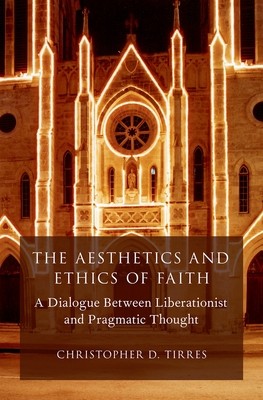
- We will send in 10–14 business days.
- Author: Christopher D Tirres
- Publisher: Oxford University Press, USA
- ISBN-10: 0199352534
- ISBN-13: 9780199352531
- Format: 16 x 23.6 x 2.5 cm, kieti viršeliai
- Language: English
- SAVE -10% with code: EXTRA
Reviews
Description
What is the future of liberation thought in the Americas? In this groundbreaking work, Christopher D. Tirres takes up this question by looking at the methodological connections between two quintessentially American traditions: liberation theology and pragmatism. He explains how pragmatism lends philosophical clarity and depth to some of liberation theology's core ideas and assumptions. Liberation theology in turn offers pragmatism a more nuanced and sympathetic approach to religious faith, especially its social and pedagogical dimensions. Ultimately, Tirres crafts a philosophical foundation that ensures the continued relevance of liberation thought in today's world.
Keeping true to the method of pragmatism, the book begins inductively with a set of actual experiences-- the Good Friday liturgies at the San Fernando Cathedral in San Antonio, Texas-- and provides a compelling description of the way these performative rituals integrate the aesthetic and ethical dimensions of faith. Subsequent chapters probe this integration deductively at three levels of theoretical analysis: experience/metaphysics, sociality, and pedagogy. As Tirres shows, the aesthetic and ethical dimensions of faith emerge in different yet related ways at all three levels. He argues that utilizing the categories of the aesthetic and ethical enables a richer understanding of the dynamic relationship between faith and politics. This book builds new bridges between a number of discourses and key figures, and will be of interest to all who are interested in the liberatory potential of engaged faith praxis, especially when it is expressed in the form of religious ritual.EXTRA 10 % discount with code: EXTRA
The promotion ends in 21d.10:56:03
The discount code is valid when purchasing from 10 €. Discounts do not stack.
- Author: Christopher D Tirres
- Publisher: Oxford University Press, USA
- ISBN-10: 0199352534
- ISBN-13: 9780199352531
- Format: 16 x 23.6 x 2.5 cm, kieti viršeliai
- Language: English English
What is the future of liberation thought in the Americas? In this groundbreaking work, Christopher D. Tirres takes up this question by looking at the methodological connections between two quintessentially American traditions: liberation theology and pragmatism. He explains how pragmatism lends philosophical clarity and depth to some of liberation theology's core ideas and assumptions. Liberation theology in turn offers pragmatism a more nuanced and sympathetic approach to religious faith, especially its social and pedagogical dimensions. Ultimately, Tirres crafts a philosophical foundation that ensures the continued relevance of liberation thought in today's world.
Keeping true to the method of pragmatism, the book begins inductively with a set of actual experiences-- the Good Friday liturgies at the San Fernando Cathedral in San Antonio, Texas-- and provides a compelling description of the way these performative rituals integrate the aesthetic and ethical dimensions of faith. Subsequent chapters probe this integration deductively at three levels of theoretical analysis: experience/metaphysics, sociality, and pedagogy. As Tirres shows, the aesthetic and ethical dimensions of faith emerge in different yet related ways at all three levels. He argues that utilizing the categories of the aesthetic and ethical enables a richer understanding of the dynamic relationship between faith and politics. This book builds new bridges between a number of discourses and key figures, and will be of interest to all who are interested in the liberatory potential of engaged faith praxis, especially when it is expressed in the form of religious ritual.

Reviews